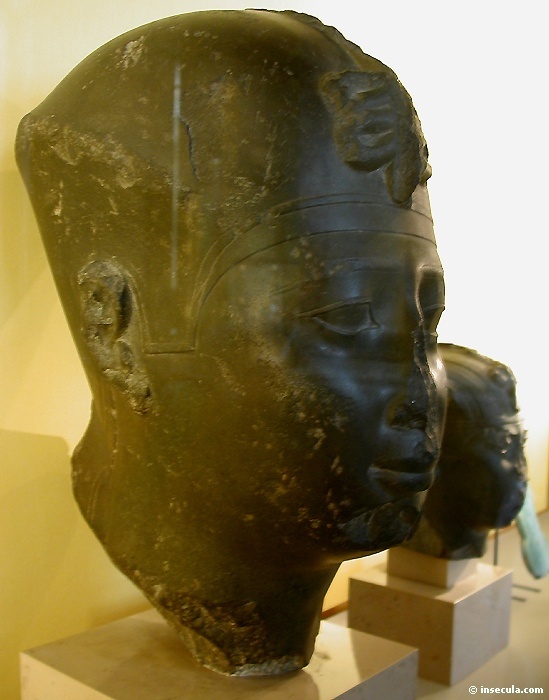
Jeremiah 44:1 the Jews… which dwell at Migdol, and at Tahpanhes, and at Noph, and in the country of Pathros
Another name for the city of Memphis is “Noph,” so the map above shows the areas where the Jews settled. Tahpanhes and Midgol were just inside the borders of Egypt. Noph (Memphis) and the land of Pathros, “land of the South” were further up the Nile. It appears that some time has passed since the Jews have arrived. They have settled in four major areas. Jeremiah is in the land of Pathros. The immediate concern about Nebuchadnezzar seems to have abated, and they are back to their own selves.
Jeremiah 44:2-6 Ye have seen all the evil that I have brought upon Jerusalem
The people have already forgotten—it seems—what happened to their land, and more importantly why it happened. The Lord has to remind them what has taken place because their behavior hasn’t changed.
“In a sense the children of Israel had returned home to the Egypt from whence Moses brought them, and they had taken their idolatry back with them. The Lord pleaded, ‘Have ye forgotten the wickedness of your fathers?’ (Jer. 44:9). Apparently they had. Jeremiah faced a new generation, in another place, who… would not listen.” (Kent P. Jackson, ed., Studies in Scripture, Vol. 4: 1 Kings to Malachi [Salt Lake City: Deseret Book Co., 1993], 210)
Jeremiah 44:14 none of the remnant… shall escape
Jeremiah had prophesied for years that some would survive the Babylonian attack. The poor of the land would be left to dwell there (Jer. 52:16). That always left the impression that there were some Jews hanging around the ruins of Judah, but the apparently that was not the case. All the remnant came into Egypt, leaving nobody in the land of Judah. Hence, “no man dwelleth therein.” (v. 2) That wasn’t the Lord’s plan; his plan was to have them stay and rebuild, to plant vineyards, and tend their flocks.
The remnant’s rebellion in fleeing to Egypt further angers the Lord, who then decides “to cut off all Judah… So that none of the remnant of Judah, which are gone into the land of Egypt to sojourn there, shall escape or remain.” The only Jews left (that we know of) will be the captives in Babylon (about 15,000), the Nephites, and the Mulekites.
Jeremiah 44:15, 19 the men… knew that their wives had burned incense unto other gods
Scholars have spent years looking for archeological evidence authenticating the Bible. These are too numerous to count, but how many times do we see sociological evidence that these are real events? In this story, human nature is on beautiful display. It’s all about the blame game between husbands and wives.
To set the stage, Jeremiah has just chastised the people for idolatry. The men from Pathros answer in effect, “It wasn’t us! Our wives have been burning incense unto other gods.” They deflect the blame as only husbands can. Like Adam in the Garden of Eden who deflected blame for eating the forbidden fruit by pointing to Eve and blaming her.
Apparently, worshipping the queen of heaven required specific oblations: incense, drink offerings, cake offerings. History and human nature suggest it was the wives who were baking the cakes and preparing the drink offerings. This particular idol seemed to appeal particularly to the women who ascribed to her all power in providing for commodities. If there was nothing good to eat around the house, it was because they had not made sufficient offerings to the queen of heaven. But the women had no intention to take all the blame. They were quick to point out that their husbands were in on it all along. They asked, “did we make our offerings without our men?” The rhetorical question confirms that the men were just as guilty. That’s how the blame game goes.
“The subtle seduction of the Blame Game can so easily lure us off the straight and narrow pathway to eternal life and exaltation. Moral agency is inextricably linked with personal responsibility and accountability. Our choices often beget consequences that reverberate far beyond the borders of our own lives. Decisions that we think are purely personal almost invariably affect the lives of others as well.
“When we disclaim responsibility for what we have done, seeking to excuse ourselves and shift the blame for adverse outcomes elsewhere, we not only fail to learn from our experiences, we may also repeat our mistakes.” (Anne Osborn Poelman, The Amulek Alternative: Exercising Agency in a World of Choice [Salt Lake City: Deseret Book Co., 1997], 101)
Jeremiah 44:17 we will certainly do whatsoever thing goeth forth out of our own mouth
“We will do whatever we want. You can’t make us behave. It is a free country.” These are the rallying cries of petulant teenagers. Isn’t that what these Jews sound like? Completely unable to submit their will to God—seemingly unaware of the concept—they confirm their right to do whatever they want.
Agency means you are free to choose right or wrong, but it doesn’t mean that you are free to choose your own consequences. You can’t pick up one end of the stick without picking up the other. Nor can you choose evil and then expect to be free from the consequence. They were right. They could do whatever they wanted, but they couldn’t control the result.
Jeremiah 44:18-19 the queen of heaven
George Q. Cannon
In the days of Jeremiah the Prophet the worship of "the queen of heaven" (Jeremiah 44:17), a feminine deity, was very common. The people of Judah attributed great power to this female deity, so much so that Jeremiah declared the word of the Lord unto them concerning their idolatrous practices and their departure from the true God. . . .
It appears from the record of Jeremiah that it was chiefly the women who worshiped this deity. . . . It was in vain that the Prophet of the true God pled with them and endeavored to show them that they were deceived and that by continuing this course they were sure to bring down the anger and the hot displeasure of the true God. . . .
It has not been uncommon for different nations to worship female deities. Pele, a female deity, was worshiped by the Sandwich Islanders. In ancient days Isis was the principal goddess worshiped by the Egyptians. . . . Perhaps this was the deity whom the Israelite exiles worshiped in Egypt, they living at Pathros, in Egypt, at the time when the interview took place between Jeremiah and them, though Aphrodite is said to have been worshiped by the Israelites in the days of their idolatry. . . .
The Greeks and Romans also indulged in the worship of female deities…
The most terrible woes which came upon Israel during their career in the land of Canaan were the result of departing from the worship of the true God and bowing down to idols and false gods.
The worship of the true God has been revealed to us. He has revealed Himself in our day. Mortal men have beheld the Eternal Father and the Redeemer, Jesus. And we know that they live. We know also that our Father in heaven should be the object of our worship. He will not have any divided worship. We are commanded to worship Him, and Him only. (Gospel Truth: Discourses and Writings of President George Q. Cannon, selected, arranged, and edited by Jerreld L. Newquist [Salt Lake City: Deseret Book Co., 1987], 106-107)
Jeremiah 44:26 I have sworn by my great name… that my name shall not more be named in the mouth of any man of Judah
One of the characteristics of the children of Israel is that the Lord saved them, accompanied them, and blessed them. He even put his name upon them; or they took his name upon them, “And they shall put my name upon the children of Israel; and I will bless them” (Numb 6:27). Well there is a blessing when we take upon us the name of God and there is a cursing when He revokes his name.
In all scriptural history, this is an unusual event. The Lord is disavowing his people, “that my name shall not more be named in the mouth of any man.” Like a father who disowns his own child, the Lord disowns his relationship with his children. He is done. They can no longer expect anything but the wrath of a just God. Cursing follows them as the night follows the day. We can expect the same for us if we completely turn from our baptismal covenants wherein we take upon us “the name of Jesus Christ, having a determination to serve him to the end” (D&C 20:37).
Jeremiah 44:28 Yet a small number that escape the sword shall return out of the land of Egypt
So a small group of repentant souls survived the violence in Egypt. We know very little about them. We know that Baruch was preserved from the Babylonians, as the Lord promised him, “thy life will I give unto thee for a prey in all the places whither thou goest” (Jer. 45:5). That must have been a comfort to Baruch. As to the fate of Jeremiah, we have no record.
Jeremiah 44:30 I will give Pharaoh-hophra king of Egypt into the hand of his enemies
“Apries (Ancient Greek: Ἁπρίης) is the name by which Herodotus (ii. 161) and Diodorus (i. 68) designate Wahibre Haaibre, a pharaoh of Egypt (589 BC – 570 BC), the fourth king (counting from Psamtik I) of the Twenty-sixth dynasty of Egypt.[3] He was equated with the Waphres of Manetho, who correctly records that he reigned for 19 years. Apries is also called Hophra in Jeremiah 44:30 (Ουαφρη[ς] in the Greek Old Testament).[4]
“Apries inherited the throne from his father, pharaoh Psamtik II, in February 589 BC and his reign continued his father's history of foreign intrigue in Judean affairs.[5] Apries was an active builder who constructed "additions to the temples at Athribis (Tell Atrib), Bahariya Oasis, Memphis and Sais."[6] In Year 4 of his reign, Apries' sister Ankhnesneferibre was adopted as the new God's Wife of Amun at Thebes.[7] However, Apries' reign was also fraught with internal problems. In 588 BC, Apries dispatched a force to Jerusalem to protect it from Babylonian forces sent by Nebuchadnezzar II. His forces were quickly crushed and Jerusalem, following an 18-month-long siege, was destroyed by the Babylonians in either 587 BC or 586 BC. His unsuccessful attempt to intervene in the politics of the Kingdom of Judah was followed by a mutiny of soldiers from the strategically important Aswan garrison.” (https://en.wikipedia.org/wiki/Apries)

(Bust of Apries, or Pharoah-hophra, from the Louvre)
“More recently, in 1909, in the course of excavations carried on by the British School of Archaeology in Egypt, the palace of King Apries, Pharaoh Hophra, has been discovered on the site of Memphis, the ancient capital of Egypt. Under the gray mud hill, close to the squalid Arab village of Mitrahenny, which every tourist passes on the way to Sakkhara, had lain for centuries Hophra's magnificent palace, 400 ft. long by 200 ft., with a splendid pylon, an immense court, and stonelined halls, of which seven have been found intact. With many other objects of value there was found a fitting of a palanquin of solid silver, decorated with a bust of Hathor with a gold face. It is said to be of the finest workmanship of the time of Apries, a relic of the fire, which, Jeremiah predicted at Tahpanhes, the Lord of Hosts was to kindle "in the houses of the gods of Egypt" (Jeremiah 43:12).
“Pharaoh Hophra, as Jeremiah prophesied (44:29), became the victim of a revolt and was finally strangled.” (http://biblehub.com/topical/p/pharaoh_hophra.htm)
